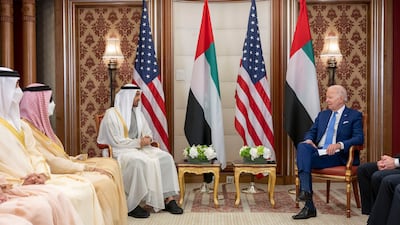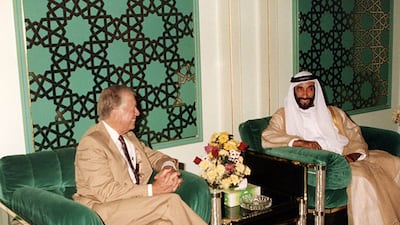History is to be made when President Sheikh Mohamed is received at the White House by US President Joe Biden.
Monday's visit will be the first time Sheikh Mohamed has visited Washington as President. It will also mark the first meeting of UAE and US presidents on American soil since the Emirates was founded.
Relations between American presidents and UAE leaders go back decades. In 2008, Sheikh Mohamed, who was Crown Prince of Abu Dhabi at the time, hosted George W Bush when the US leader travelled to the country to meet former UAE President, the late Sheikh Khalifa, in Abu Dhabi. The occasion was the first official visit to the Emirates by a sitting American president.
Five months later, Sheikh Mohamed held talks with Mr Bush at Camp David. Sheikh Mohamed, as Crown Prince of Abu Dhabi, was also received in Washington by presidents Barack Obama and Donald Trump.
Sheikh Mohamed also met Mr Biden at a summit in Jeddah two months after becoming President of the UAE in May 2022. They also held talks at the G20 summit in New Delhi in 2023.

Landmark visit
But the significance of the first official visit to Washington by a UAE President cannot be understated. It comes at a time of great tension and instability around the world, not least in the Middle East, with the UAE and US not always seeing the way forward from the same perspective.
That does not mean there is a deep divide between the countries, but they differ in some policy areas. The UAE and US “work together to promote regional security, create economic prosperity and address pressing global challenges”, the UAE embassy in Washington says on its website.
The US State Department, meanwhile, says the UAE holds “an influential role in the Middle East and is a key partner for the United States. The United States and the UAE enjoy strong bilateral co-operation on a full range of issues”.

Diplomatic pleasantries aside, the record book underlines the importance of Monday’s meeting. The Office of the Historian at the US Department of State publishes meticulous records of overseas visits by American leaders going back to 1901. It shows US Presidents have received more than 190 world leaders since 1874 – the UAE excepted.
Longstanding friendship
While the US was among the first countries to recognise the UAE after it was founded in December 1971, the inaugural recorded meeting between a senior US official and a UAE president in the Emirates came in 1990, on the eve of the First Gulf War. James Baker, secretary of state under president George HW Bush, held talks with UAE Founding Father, the late Sheikh Zayed bin Sultan Al Nahyan.
Sheikh Zayed was already familiar with the US and its leaders, of course. His first visit to the country was in 1957, accompanying his brother, Sheikh Hazza bin Sultan, who was having medical treatment in New York. In 1999, Sheikh Zayed travelled to Cleveland, Ohio, and received Richard Clarke, a veteran adviser to US presidents and strong supporter of the UAE.
Sheikh Zayed met former US president Jimmy Carter in Abu Dhabi in 1990. Mr Carter was on a mission to eradicate Guinea worm disease from Africa and the support he received from Sheikh Zayed continues to have an effect today.
In 1998, Sheikh Khalifa, Crown Prince of Abu Dhabi at the time, visited Washington for talks with president Bill Clinton, with an agreement struck for the UAE to receive 80 F-16 fighter jets.
US records show there were no visits by a US secretary of state to the UAE between 1991 and 2006. But since then those holding the office have travelled to Abu Dhabi 18 times, under four different US presidents. Condoleezza Rice, Hillary Clinton, John Kerry, Mike Pompeo and the current Secretary of State Antony Blinken have also made trips to the UAE.

Mr Kerry served as secretary of state during the Obama presidency, a period of tension between the US and the Gulf. Mr Obama’s “pivot” away from the Middle East towards China and his decision to finalise the Iran nuclear deal in 2015 without consulting Gulf states were poorly received in the region.
Relations warmed during the Trump administration, with the Abraham Accords signed in Washington in 2020. But the staunch support of the US towards Israel as the Gaza war rages has once again tested relations between America and the region.
But the depth of the ties between the UAE and US is clear, whether it is the sharing of intelligence, the presence of American military personnel at Al Dhafra Airbase, bilateral trade that now exceeds $30 billion, or the cultural links epitomised by the founding of New York University Abu Dhabi.
What is certain is that, when the countries' leaders meet next week, there will be no shortage of things to talk about.














